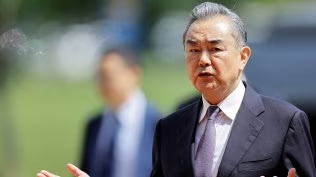In a first, Japan’s ‘naked man’ festival to allow women to participate
In a first, a Japanese shrine renowned for its ‘naked man’ festival will now allow women to participate in the rituals, as per a news report.
The festival takes place in Konomiya Shrine in Inazawa town of Aichi prefecture and dates back to 1,250 years ago, reported The South China Morning Post. Around 10,000 people are expected to take part in the festival on February 22.

An official of the organising committee said that women were not explicitly banned from the festival this year and 40 women have expressed interest in taking part in the coming ritual offering of bamboo at the shrine.
“We have not been able to hold the festival like we used to for the past three years because of the pandemic and, in the time, we received a lot of requests from women in the town to take part,” the official said, as per the SCMP report.
The Hadaka Matsuri festival, which is traditionally open to only men, reportedly involves a local man who is designated as the shin-otoko, or “god man” in Japanese. Every year, hundreds of believers clad solely in loincloths parade through the town to the shrine, bathing each other in icy water, drinking sake (a local rice wine) and hefting portable shrines on long bamboo poles decorated with ribbons attempt. On reaching the shrine, they call out for the ‘god man’, who had been kept in solitude in the days leading up to the festival, and try to touch the completely naked man. It is believed that whoever touches the shin-otoko transfers their bad luck to him.
The report said that while women would be a part of the rituals in the run-up to the finale, they would not participate in the crowding ritual at the end.
Ayaka Suzuki, who is a part of the team taking part in the event this year, told a local paper that the event is the most important one in her town’s calendar and she had long wanted to be a part of it.
“I could have participated if I were a boy,” she reportedly told the Yomiuri newspaper, adding that she intends to “pray for the safety of my family and the people affected by the Noto Peninsula earthquake.”
Besides gender equality, experts have suggested that the mass migration from rural areas to cities for work has risked the demise of ancient traditions.
Sumie Kawakami, a university instructor who focuses on gender-related issues in Japan, told SCMP that she was “surprised and delighted” at the shrine’s decision. “I am very glad to hear this and it is a good sign that Japan is moving forward, although it is of course long overdue,” she told SCMP.
“There are other areas of life in Japan where women are not permitted to participate, such as the ban on women stepping into the ‘dohyo’ sumo ring, and I think that the Shinto religion is quite restrictive for women,” Kawakami observed, addingm “Buddhism, on the other hand, is more tolerant and there are female Buddhist priests as well as male priests,”.
“That sort of gender-friendly approach should be the way forward,” she said.
Disclaimer: The copyright of this article belongs to the original author. Reposting this article is solely for the purpose of information dissemination and does not constitute any investment advice. If there is any infringement, please contact us immediately. We will make corrections or deletions as necessary. Thank you.





